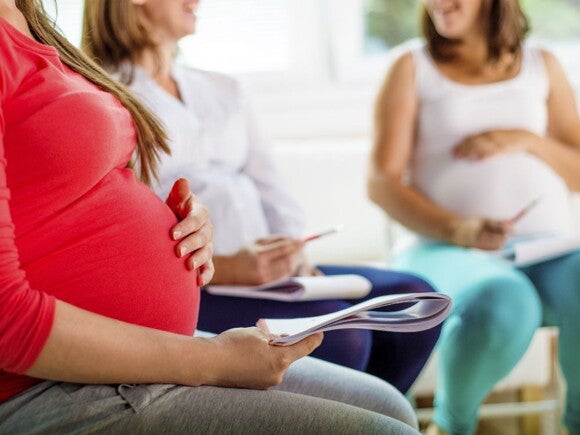
Your Baby at 27 Weeks
Your baby still needs to grow. Their respiratory system has everything it needs to allow your little one to breathe, but it is still too immature to actually do so without a lot of help. At this point there is usually enough surfactant (a substance that lines the inside surface, facilitating the cells to open and allow the breathing in-and-out motion) and enough blood vessels to permit gas exchange such that infants born prematurely at this age may survive with intensive care.
At 27 weeks, your baby is around the length of a parsnip and their respiratory system now has everything they need to allow them to breathe outside of the womb at full term.
Your Body at 27 Weeks Pregnant
You will notice your weight gain and size of your belly really ramps up from now, until you deliver your baby. Weight gain is an individual response so try not to compare yourself to others. You may also notice with this growth, dreaded stretch marks! These pink or purple lines can develop on any part of the skin that is growing – tummy, breasts, etc. and will likely fade over time.
Diet for Week 27 of Pregnancy
One of the best ways to meet your nutrition and energy needs is by eating a variety of foods from the different food groups. This includes servings from the meat (or other proteins), dairy, fruit, vegetables, and grain groups. Although your health care professional may have prescribed a supplement of certain vitamins or minerals, it is still important to consider the fibre and energy that food brings to your diet. Think back over the last few days and ask yourself if you have missed eating foods from one of these food groups. If so, it’s time to put foods from that food group on your shopping list and keep them at the front of the refrigerator or pantry. Try to eat from each food group, each day.
Tips for Week 27 of Pregnancy
Even if an experienced mum, it can be helpful to take antenatal classes that prepare you for childbirth. Researchers are constantly discovering new information that can help you during your pregnancy and delivery. Understanding the changes occurring in your body during labour and delivery and learning some good relaxation techniques for when the time comes, may make all the difference.
Many expecting mothers will also consider hosting their baby shower in their third trimester. Check out our guide on fun baby shower games and other ideas to get you prepared and excited!






